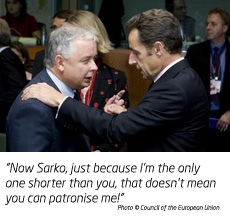 It’s the first rule of EU negotiations: present a united front in Brussels and then, even if things don’t go your way, you can retreat to your national capital and say “OK, at least we fought for X, Y or Z”. Not so for Poland at this week’s European Council according to an amusing yet alarming article from EUObserver, detailing the tensions between Polish PM Tusk and President Kaczynski. The latter even chartered a plane to get himself to Brussels as Tusk had barred him using Polish government planes.
It’s the first rule of EU negotiations: present a united front in Brussels and then, even if things don’t go your way, you can retreat to your national capital and say “OK, at least we fought for X, Y or Z”. Not so for Poland at this week’s European Council according to an amusing yet alarming article from EUObserver, detailing the tensions between Polish PM Tusk and President Kaczynski. The latter even chartered a plane to get himself to Brussels as Tusk had barred him using Polish government planes.
From the EU side European Council meetings are for Heads of State and Government (so you get Sarko, a President, and Brown, a Prime Minister) but that does not answer what happens when you have a cohabiting arrangement with a Prime Minister and President from different parties who dislike each other and also seem to have little respect for either decorum or protocol.
It would not surprise me in the slightest if Vaclav Klaus, the Czech President, would perform similar antics in the future, yet I cannot imagine any politician from the old EU-15 Member States behaving that way in Brussels – or at least not so openly.








I don’t think it was the Foreign Minister (Sikorski) who couldn’t go. If I’m not mistaken, it was the Finance Minister. Sikorski was involved in this, in the sense, that he criticized Kaczynski for going and thereby depriving the Polish delegation of a competent representative in Brussels on the financial issues.
Although I believe that Kaczynski behaved in a shameful manner, I believe that the Council might adopt a possibility to soften its rule of procedure. By limiting to two people the number of seated persons, it gave the Polish president a small victory by forcing the foreign affairs minister out. This kind of person deserves no victory.
@Jon: Well, but Berlusconi was President in Office of the European Council, that means it was also partly Eu vs Eu.
Maybe your comment about Her Majesty show the solution to the Lisbon Treaty impasse. Instead of having a semi-permanent President of the Council, why don’t we just have an emperor?
I think most Poles see this, but cannot do much about it until the next election. While Kaczynski enjoys support from the older, rural voters, younger and more educated Poles resent the bad rap Kaczynski is inflicting to Poland’s reputation (hence Tusk’s election).
@Igor – at least Prodi and Berlusconi were not in the same administration! That was – partly – Italy vs. the EU. Yesterday’s antics are Poland vs. Poland.
For whatever her faults Queen Elizabeth at least understands decorum! And I say that as a vehement anti-monarchist…
Fighting over who gets to sit in the chair when the music stops is fine for Musical Chairs at primary school parties – but not for the EU Summit…
Absolutely unacceptable…
And just to go into a tad of hyperbole – Does this now set a precedent for the EU Summit, or is this a special case like Kosovo? Can we expect to need to double the chairs? Perhaps the Queen of England wants to join in…
Like little kids, totally unprofessional and not at all helpful for the work of the European Union.
The Kaczynskis have brought nothing but stupidity into the work of the EU during the last years.
Jon,
Actually it is heads of state or government (not and), which makes it interesting.
Each member state needs internal rules on powers and representation, if they have both a (political ) head of state and a (parliamentary) head of government.
Less spectacular than Poland, Finland has managed to create an ongoing problem of the same kind, commonly known as the problem of two (dinner)plates.
In a larger context, this illustrates one of the reasons why the Constitutional Treaty’s and Lisbon Treaty’s so called innovation to establish a semi-permanent president for the European Council is problematic.
In the long run, the European Commission should morph into the EU government and the Council become the upper house of parliament.
Despite the various national models in Europe, I think that one government chief, accountable to the parliament elected by (EU) citizens is the right way to go, for the EU and nationally.
The people who launched the one president campaign were on the right track, but sadly the EU seems to grow more intergovernmental by the day.
Something similar happened during the last Italian Presidency, when Berlusconi chaired the European Council and Prodi the Commission. You had Berlusconi saying things like: “Shouldn’t we abolish the European Commission?” and Prodi actively working to undermine the Presidency. The EU Institution were used to fight a national political (and personal) battle. Shameful.